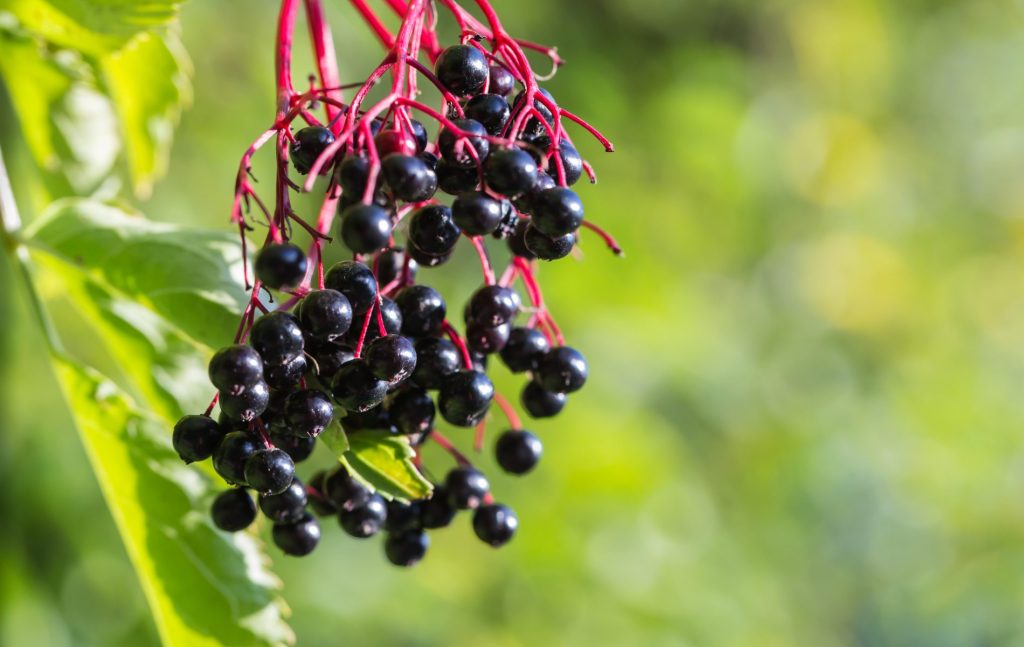Elderberries are a fruit that is native to Europe and North America. They are commonly used for their medicinal properties but are also used in cooking and can be found in various forms, such as syrups, jams, and teas.
Table of Contents
What is an Elderberry?
Elderberry is a dark purple fruit from the European elder tree, native to Europe and North America. It is also known by other names, such as Sambucus nigra, Elder, and Black Elder.
Elderberry is a small, round fruit that grows in clusters like grapes and red currants. When fully ripe, the fruit is deep, dark purple, and covered in a powdery bloom that can easily be rubbed off. The flesh is juicy and slightly tart, like a grape or blueberry.
In terms of flavor profile, elderberries have a unique sweet and tangy taste. They are commonly used in culinary applications, particularly in jams, jellies, pies, and syrups. Elderberry is also used to make wine, cordials, and sometimes as a flavoring for teas and other beverages.
Elderberry has a long history of medicinal use, and it has been used for centuries to treat various ailments, including colds, flu, and fever. The fruit contains antioxidants, vitamins A and C, potassium, calcium, and iron.
It is essential to distinguish Elderberry from American Elder, Elderflower, or Dwarf Elder. Elderflowers are part of the same plant and usually appear mid-summer; they are also edible. Once the flowers are finished, they develop into berries.
The History of Elderberries
The first record of Elderberry seeds was believed to be in Switzerland from around 2000 BCE.
Elderberries often appear in Indigenous folklore and legends across different regions and cultures. They have also been used as traditional medicine for thousands of years.
One particular legend features the Elder Mother, also called Hyldemoer, a spirit believed to reside within the plant. People believed that harming the elderberry plant could cause the release of terrible curses, and it was even thought to repel evil spirits and witches.
Elderberries were also mentioned in the writings of Hippocrates and Pliny the Elder.
Throughout history, Elderberry plants have been used for various purposes, including providing wood for musical flutes for fairies and distracting vampires from entering windows. In modern times, Elderberry has retained its mystical reputation and is cultivated on a small scale for culinary, medicinal, and cosmetic use.
To increase the magic further, you might have even heard of Elderberries as used in making the famous Elder Wand from Harry Potter.

What Does an Elderberry Taste Like?
Elderberries have a unique flavor described as tart, tangy, and slightly sweet. When eaten raw, elderberries have a more pronounced tartness and astringency. Some people also describe their taste as earthy or musky.
Elderberries can be transformed into a deliciously sweet and slightly sour syrup or jam when cooked. The heat helps break down some of the tartness and brings out more of the sweetness in the fruit. Elderberry syrup is commonly used as a natural remedy for colds and flu and is often mixed with honey to enhance its flavor and health benefits.
How to Tell When Elderberries Are Ripe
Here’s how to tell when elderberries are ripe and how to select the best ones:
| Color | Ripe elderberries are dark purple to black. They will have a uniform color and no green or red hues. The berries on the cluster should all be similar in color. |
| Texture | The berries should be firm and plump, not soft or mushy. They should also have a slight give when squeezed. Overripe berries will be soft and might even be wrinkled. |
| Clusters | The clusters should be heavy and full. Ripe elderberries hang down more from the cluster than unripe berries. |
| Scent | Ripe elderberries have a sweet and slightly musky aroma. If the berries smell sour, they may be overripe or spoiled. |
Can I Eat Raw Elderberries?
No, it is not safe to eat raw elderberries. While elderberries can be used in cooking and medicinal preparations when adequately prepared, the raw berries and other parts of the elderberry plant contain a toxic substance called cyanogenic glycosides. These can cause cyanide poisoning, mainly if the berries are not fully ripe or have not been cooked or processed correctly.
Therefore, it is essential to ensure that elderberries are appropriately cooked or processed before consuming them, as this breaks down the glycosides, rendering them safe for consumption.
Cooking with Elderberries
Elderberries are a versatile fruit that can be cooked in various ways. They can be cooked into syrup or jam, added to baked goods, or used in savory dishes. In traditional cuisines, elderberries are often found in European and North American cooking, especially in regions where elderberry bushes grow naturally.

Here are some specific dishes that feature elderberries:
Elderberry Jelly: This jelly is warm and comforting. It’s perfect for slathering on toast and biscuits or as a glaze for roasted meats.
Homemade Elderberry Syrup: This syrup is made with elderberries and some warm spices, and it’s a powerhouse of immune-boosting goodness. Plus, it’s perfect for drizzling over pancakes, stirring into tea, or just sipping straight up.
Elderberry Gin: Gin got much more interesting (and healthy?) with this elderberry-infused concoction. Not only does it add a unique flavor to your favorite cocktail, but elderberries also bring their immunity-boosting A-game to the party.
Blueberry Elderberry Cake Roll: Who says cake rolls can’t be healthy? This dessert is a berry-licious treat that combines the sweetness of blueberries with the tang of elderberries.
Immune Boosting Elderberry Smoothie Bowl – This 4-ingredient smoothie bowl is the perfect way to start your day. Made with elderberries, bananas, and coconut milk, it’s a tasty and nutritious way to give your body the energy it needs to take on the day.
How to Store Elderberries
Fresh elderberries can be stored at room temperature for a few days, ideally in a cool and dark place, but just for a few days. To extend the shelf life of fresh elderberries, store them in a perforated plastic bag in the fridge. The perforations will allow for airflow and help prevent moisture buildup, which can cause mold growth.
Fresh elderberries stored in the fridge can last up to a week. If you want them to last even more, you can freeze them and store them in the refrigerator for up to a year. Lastly, you can dry elderberries and store them in an airtight container in a cool, dry place. This way, they can last up to a year.
Nutritional Benefits of Elderberries
Elderberries have been considered good for your health for thousands of years. They provide numerous vitamins and minerals that benefit the human body, such as vitamin C, fiber, iron, potassium, and vitamin A, flavonoids. Elderberries also contain anthocyanins, plant pigments that give the berries their dark purple-blue color.
Together, they strengthen the immune system, regulate the digestive tract, reduce high cholesterol in the liver, help transport oxygen, balance fluid levels throughout the body, and maintain healthy organ functioning.
Note: Raw elderberries contain cyanogenic glycosides, which are considered toxic and may cause harmful side effects like diarrhea and nausea. However, cooking the berries breaks down the toxins and makes them safe for consumption. It’s also not recommended to consume elderberries if you’re currently breastfeeding.
Black elderberry supplements are often used for problems with constipation. The dietary supplements are also excellent for severe colds, respiratory infections, and flu symptoms, reducing the duration of these symptoms. You can also find this fruit in other forms, such as syrups, gummies, lozenges, and teas.
Where to Purchase Elderberries
You can buy elderberry fruit in various forms, including fresh, frozen, dried, or as a juice or extract. The availability of fresh elderberries is limited to specific regions and times of the year.
If you want fresh elderberries, your best bet may be to check with local farmers’ markets or specialty food stores that carry seasonal produce. Some supermarkets may also stock fresh elderberries during peak season.
If fresh elderberries are unavailable in your area or out of season, frozen or dried ones can be purchased online or in health food stores. Elderberry juice and extracts are also widely available in health food stores, grocery stores, and online retailers.

